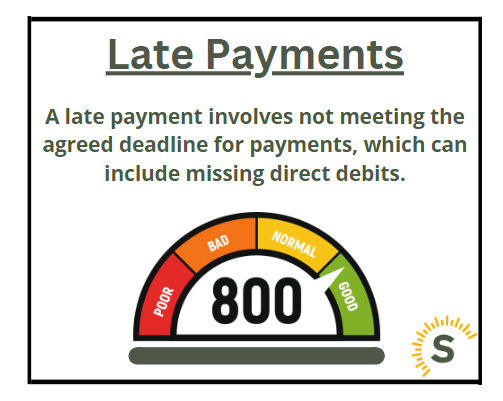
Your credit score holds incredible power in your financial life. It's a number that can make a big difference in your ability to get loans, mortgages, and credit cards. But it's not just about borrowing – it's also a reflection of how well you handle money you've borrowed before.
In this insight, we'll break down why having a good credit score really matters. From getting approved for loans on better terms to having an impact on where you live and work, your credit score is like a financial fingerprint that can shape your future.
Paying your bills on time is perhaps the most crucial step in building and maintaining a good credit score. Late or missed payments can have a significant negative impact on your creditworthiness. To ensure you never miss a payment, consider setting up automatic payments or reminders. This way, you can stay on top of your financial obligations and avoid unnecessary penalties or damage to your credit score.

Using credit responsibly is another key factor in building a strong credit score. It's important to demonstrate that you can borrow money and repay it responsibly. Here are a few tips to help you use credit wisely:
Aim to use only a small percentage of your available credit. This shows lenders that you are not reliant on credit and can manage your finances responsibly. Consider paying off your credit card balances in full each month to keep your utilization low.
Maxing out your credit cards can signal financial instability and negatively impact your credit score. Instead, try to keep your credit card balances well below the credit limit.
While having a diverse mix of credit accounts is beneficial, avoid opening too many accounts within a short period. Each new credit application creates a hard inquiry on your credit report, which can temporarily lower your score.
Registering on the electoral roll can positively impact your credit score. It provides proof of your address and stability, making you appear more reliable to lenders. Make sure you are registered at your current address and update your details whenever you move.
You can register on the electoral roll at the Gov.UK website. It's as simple as completing an online form confirming your address,

Find out: Am I On The Electoral Register?
It's crucial to regularly check your credit report for errors or fraudulent activity that could negatively impact your credit score. You can request a free credit report from each of the credit reference agencies in the UK: Experian, Equifax, and TransUnion. Review your report for inaccuracies, such as incorrect personal information or accounts you don't recognize. If you find any errors, contact the relevant credit agency to have them corrected.
Try it FREE for 30 days, then £14.99 a month - cancel online anytime

If you're struggling to build credit or have a limited credit history, a credit-building credit card can be a valuable tool. These cards are designed for individuals with low credit scores or no credit history. By using a credit-building card responsibly and making regular, timely payments, you can demonstrate your creditworthiness and gradually improve your credit score.
Before we dive into the strategies for building your credit score, it's important to understand the factors that influence it. In the UK, credit scoring agencies, such as Experian, Equifax, and TransUnion, use various criteria to calculate your credit score. Here are the key factors they consider:
This is one of the most critical factors in determining your credit score. Lenders want to see that you consistently make payments on time. Late or missed payments can have a significant negative impact on your credit score.
This refers to the amount of credit you are currently using compared to your available credit. Keeping your credit utilization low (typically below 30%) demonstrates responsible borrowing behavior and positively impacts your credit score.
The length of time you've had credit accounts is also taken into account. A longer credit history can be beneficial, as it provides more data for lenders to assess your creditworthiness.
Having a diverse mix of credit accounts, such as credit cards, loans, and mortgages, can positively impact your credit score. It shows that you can handle different types of credit responsibly.
Each time you apply for credit, it creates a hard inquiry on your credit report. Multiple recent inquiries can temporarily lower your credit score, as it may indicate a higher risk of taking on too much debt.
Now that we understand the factors that affect your credit score, let's explore five actionable steps you can take to build and improve your creditworthiness in the UK.
Building a credit score is a process that requires time and responsible financial habits. However, there are several common misconceptions that can hinder your progress. Let's address a few of them:
While it may seem logical to close unused credit accounts, doing so can actually harm your credit score. Closing accounts reduces your available credit, which can increase your credit utilization ratio. Instead, consider keeping older accounts open and using them occasionally to maintain a positive credit history.
While it's true that using cash can prevent you from accumulating debt, it won't help you build a credit score. Lenders need to see evidence of your ability to manage credit responsibly. Using credit cards and loans responsibly and paying them off on time is crucial for building a credit history.
This is a common misconception. When you check your own credit score, it's considered a soft inquiry and does not affect your score. Only hard inquiries, which occur when you apply for credit, can temporarily impact your credit score.
If you move to the UK from another country, your credit history may not automatically transfer. However, some lenders may consider your overseas credit history when assessing your creditworthiness. It's important to establish a credit history in the UK by following the steps we've outlined.
In addition to the five strategies mentioned earlier, here are a few more tips to help you improve your credit score:
Building and improving your credit score is not an overnight process. It requires patience, persistence, and consistent financial habits. It's important to stay committed to responsible credit management, such as paying your bills on time and using credit wisely.
Remember that your credit score is a reflection of your financial behavior over time. By implementing the strategies outlined in this article and maintaining good financial habits, you can gradually improve your creditworthiness and achieve your financial goals.
If you're facing significant credit challenges or struggling to improve your credit score on your own, you may consider seeking professional help. Credit repair companies specialize in assisting individuals with credit issues by identifying errors, disputing inaccurate information, and providing guidance on improving creditworthiness.
When choosing a credit repair company, be sure to research and select a reputable organization with a track record of success. Read reviews, check their accreditations, and understand the fees involved before committing to their services. It's important to remember that credit repair companies cannot guarantee specific results or remove accurate information from your credit report.
Building and maintaining a good credit score is essential for achieving your financial goals in the UK. By understanding the factors that affect your credit score and implementing the actionable steps outlined in this article, you can take proactive measures towards improving your creditworthiness.
Remember to pay your bills on time, use credit responsibly, register on the electoral roll, regularly check your credit report, and consider a credit-building credit card if necessary. Avoid common misconceptions about credit scores and be patient and persistent in your efforts.
Monitoring your credit score using available resources and seeking professional help if needed can further support your credit-building journey. With time and responsible financial habits, you can build a strong credit score that opens doors to better financial opportunities and helps you achieve your dreams in the UK.

Stuart is an expert in Property, Money, Banking & Finance, having worked in retail and investment banking for 10+ years before founding Sunny Avenue. Stuart has spent his career studying finance. He holds qualifications in financial studies, mortgage advice & practice, banking operations, dealing & financial markets, derivatives, securities & investments.





Our website offers information about financial products such as investing, savings, equity release, mortgages, and insurance. None of the information on Sunny Avenue constitutes personal advice. Sunny Avenue does not offer any of these services directly and we only act as a directory service to connect you to the experts. If you require further information to proceed you will need to request advice, for example from the financial advisers listed. If you decide to invest, read the important investment notes provided first, decide how to proceed on your own basis, and remember that investments can go up and down in value, so you could get back less than you put in.
Think carefully before securing debts against your home. A mortgage is a loan secured on your home, which you could lose if you do not keep up your mortgage payments. Check that any mortgage will meet your needs if you want to move or sell your home or you want your family to inherit it. If you are in any doubt, seek independent advice.